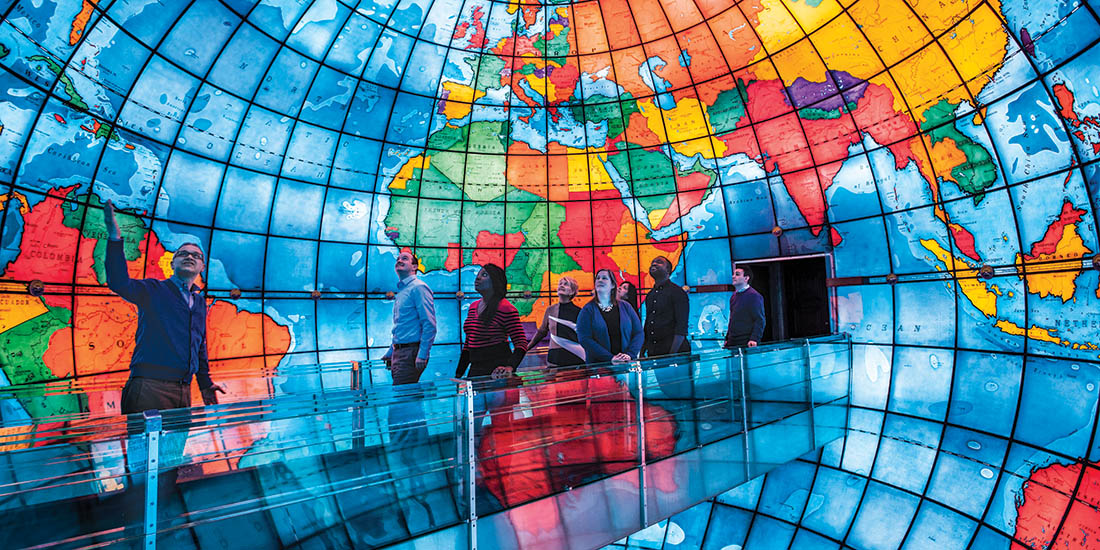Religion at the Ninth Annual Meeting of the Society for U.S. Intellectual History
I did not attend all of the panels on religion at the Ninth Annual Meeting of the Society for U.S. Intellectual History. My brief reflections here are in response to the panels I did attend (including my own) but I also make mention of the many projects of interest to our readers. I left with two questions and bring attention to two trends.
S-USIH offers a space for historians of religion from various organizations – the ASCH, the ACHA, the AAR, etc. – to meet and explore common interests. The common thread at the 9th Annual S-USIH is an interest in how the study of religion overlaps with the study of thought more broadly.
Two Questions: Synthesis and Lived Religion
 |
| The Mapparium |
 |
| In God We Trust, Congress's Rostrum |
We might also dwell on how religious pluralism feeds into the broader theme of “The Culture of Democracy.” James Kloppenberg’s Toward Democracy makes the case that the ethical teachings of Christianity, and the small Protestant towns of New England, facilitated the rise of our current democratic political horizons. Papers by Benjamin E. Park, Matthew Bowman, and Lily Santoro considered “Protestant Democratic Culture,” “Civic Religion,” and the concept of “Fit Christian Citizens.” My own paper looked at how Catholics fit into culture of democracy: culture, meaning a series of practices, ideas, and ideals to work towards.Gale Kenny ended a roundtable on the state of the field of religious history with a provocative question: is US Intellectual History Protestant history?
How will intellectual historians address the issues raised by historians of lived religion? The theory of lived religion – and its emergence out of archival sources – poses a serious epistemological challenge to intellectual historians. Cultural history dwells on the incongruous nature of religion or its eclectic nature. Religious thoughts are seen as provisional and experimental. At the state of the field panel, Erin Bartram raised the question about the relationship between sources in the intellectual history canon where religion appears organized and sources like diaries in which subjects feed off multiple fonts of religious ideas. The panel considered the issue at length but never shied away from the suggestion that the archives – and certain methods of social history – are a boon to intellectual history and the history of religious thought. Rendering religion into a systematic body of thought with the tools of intellectual history remains a productive endeavor for our field and for understanding religion more broadly. Dan Hummel’s paper raised the question of how the historian of religion – while “taking religion seriously” – also considers how religion is shaped by other realms of behavior: social, cultural, economic, and political. Ben Wright responded with a question of what it might mean to be seduced by religious subjects who wanted the people around them to think they were religious. The state of the field panel considered how to balance the fairly streamlined content of doctrine next to the messiness of religion in the lives our subjects. How should intellectual historians approach these problems?
Trends: International History and Gender
American religion is very much “out in the world,” as panels in Dallas amply demonstrated. S-USIH conference presenters operate in the jet stream of Andrew Preston’s Sword of the Spirit, Shield of Faith: Religion in American War and Diplomacy and David Hollinger’s Protestants Abroad: How Missionaries Tried to Change the World but Changed America. Woodrow Wilson’s social gospel now plays an important role in American empire (Cara Burnidge), missionaries imbued science in Hawaii with the divine (Tracy Laevelle), and religion, of course, also challenged empire (Ray Haberski). As mentioned above, Lauren Turek’s work brings the fields of American religion and international human rights history into conversation. Emily Conroy-Krutz’s paper on the state of the field panel considered how recent books by Christine Heyrman and Michael Altman study religion abroad to illumine religious issues in America. Conroy-Krutz makes the important point that recent scholarship has portrayed missionaries both as purveyors of bias and important sources of cosmopolitanism. The subjects we study in the field of American religious history go out into the world and think about a wide range of issues. Religion is exported as well as imported.

Women’s and gender history intersected with long-standing research trends in the field of American Intellectual and religious history. These approaches are producing new insights into old questions. Erin Bartram offered an analysis of how gender shapes the construction of the female self in the nineteenth century. Religion and religious questions are involved in the construction of the self and the recognition of boundaries between the individual and society. Elesha Coffman discussed the ways the legacy of Betty Friedan occluded historians’ understandings of Margaret Mead, the subject of her new book Oxford’s Spirited Lives series. Andrea Turpin’s paper considered women from both sides of the Fundamentalist-Modernist controversy. Elizabeth H. Flowers asked why women were so involved in spreading the doctrine of inerrancy in the late twentieth century. Karen K. Seat looked at how ideas of women’s labor helped to explain the general turn towards neo-conservative policy during and after the Reagan era. These papers demonstrated that women thinkers and ideas about gender shaped key trends in American history: the rise of the self, fundamentalism, the rise of the right, second wave feminism, and neoliberalism.


Comments